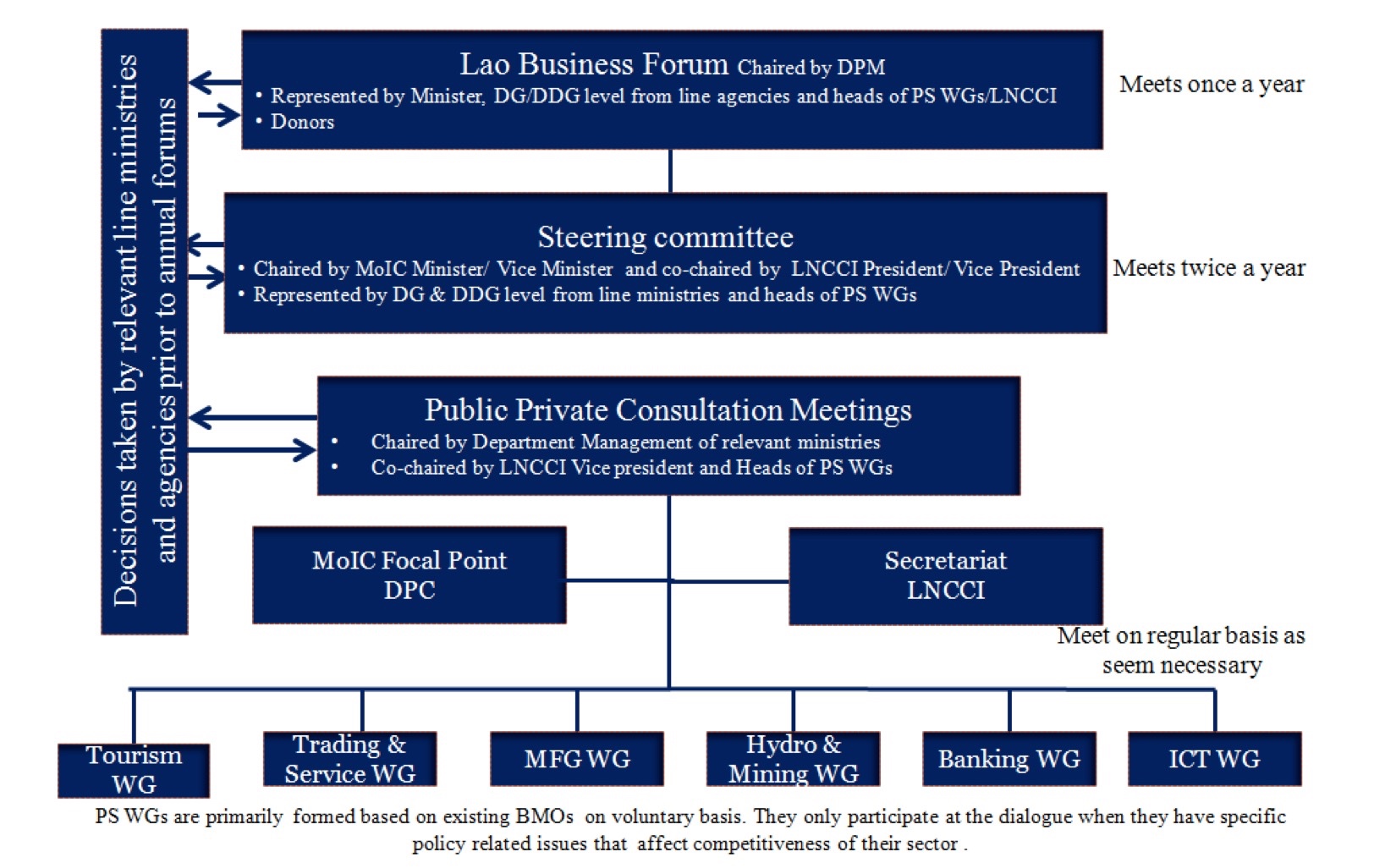Overview of the Lao Business Forum
The Lao Business Forum was launched in March 2005 as a joint initiative between the International Finance Corporation (IFC) and the Ministry of Planning and Investment (MPI). The IFC staffed the LBF Secretariat from 2005 until its exit in 2010. Since then, LNCCI performs Secretariat functions for the LBF and is responsible for overall coordination and facilitation. In mid-2015, the Ministry of Industry and Commerce (MOIC) was assigned to act as coordinating body for the public sector to facilitate dialogue process on behalf of the government by taking over the role from MPI. Since May 2016, the Lao Business Forum received technical support from the Second Trade Development Facility – TDF II to resume the public private dialogue process with a full functional secretariat set up under LNCCI and a Focal Point for the public sector established under the Department of Planning and Cooperation at the Ministry of Industry and Commerce responsible for overall oversight and follow-up.
The objectives of the LBF are to: 1) facilitate public and private sector dialogue, including participation by the broadest range of private sector companies, from domestic SMEs to foreign investors; 2) ensure consistent enforcement and transparent interpretation of laws and regulations; 3) remove the bureaucratic impediments that businesses encounter in entry and exit processes and provide feedback on business-related policies, laws and regulations that impact the private sector ; and 4) provide feedback on draft government laws and regulations that could potentially impact the business community and assist the Lao government in private sector-related policy development.
The LBF is organized at four levels:
- Annual Forum. The Annual Lao Business Forum is held once annually and is chaired by the Prime Minister or Deputy Prime Minister in charge of economic affairs. The forum provides an opportunity for Private Sector Working Groups and key business associations in Lao PDR to inform top-level government officials about their achievements during their regular meetings and to identify unresolved issues.
- Steering Committee (SC). SC meetings are convened twice a year in advance of the Annual Forum in order to review progress, finalize the forum agenda and agree on key forum inputs. Membership of the SC consists of representatives from line Ministries/agencies (department management level) and heads of private sector working groups. The committee is chaired by MoIC Minister and co-chaired by LNCCI President. Based on the advice of the Secretariat, the SC meeting will consider priority business reforms and decide on remedial measures or refer issues to relevant government entities. These steps ensure that priority actions are fully vetted prior to presentation during the Forum
- Public Private Consultation (PPC). PPC meetings occur prior to the bi-annual SC meetings. PPC meetings for specific Working Groups occur as regularly as required between the six-month period between SC meetings. Each meeting is co-chaired by LNCCI Vice President and DG/DDG of relevant department of government Ministries and participated by key members of respected PS WGs.
- Private Sector Working Groups (PSWG). There are currently 16 Private Sector Working Groups (PSWG) in the LBF. Meetings are open to private sector members of the PSWG as well as any other companies that are interested in attending. The LBF Secretariat assists the PSWGs in formulating their policy ideas prior to PPC meetings.
- Sectoral working groups: ICT, Manufacturing, Trade, Services, Agro-processing; Handicrafts; Transportation & Logistics; Construction; Mining; Tourism; Banking & Insurance; Hydropower
- Other working groups: Cross-Cutting, State-owned Enterprises (SoEs), SMEs, Businesswomen
LBF Structure chart

Role of the LBF Secretariat
The LBF Secretariat maintains a database of active participants in the Forum, facilitates the discussions of PSWGs; liaises with the Lao Government when requested; assists in the compilation and distribution of issues matrices and other documents; solicits comments from WGs on draft laws and regulations; and generally, enhances the activities of the LBF by facilitating the participation of the domestic and foreign business communities.
The Secretariat also arranges meetings between government and the WGs. Finally, where appropriate, the Secretariat assists both the Government and the private sector to analyse issues constraining growth, and make recommendations based on best practices in the region and elsewhere, though it has no decision-making or policy-making powers.
The Secretariat is based in the office of LNCCI and is supervised by a Senior LNCCI Executive and Secretary General. The Secretariat consists of a Private Sector Development consultant and an administrative assistant.
Role of the Government Focal Point
The Department of Planning and Cooperation of the Ministry of Industry and Commerce acts as main coordinating body for the public sector to ensure effective public-private dialogue at Public Private Consultation Meeting level as well as effective operations of the Steering Committee and annual Business Forum in closed coordination with LNCCI.
The Secretariat is also responsible for internally monitoring and tracking actions that have been agreed at the Forum level (similar to the matrix being used by the TFS) and be responsible for follow-up with line Ministries. It is also responsible for updating publicly available information on reform progress undertaken as part of the new Lao Business Forum format.
Donor Participation
Bilateral and multilateral donor agencies that are members of the Roundtable Meeting are invited to attend annual Forum and observe other LBF activities in order to promote an effective link between policy recommendations for private sector development and the donors whose projects support private sector development.

